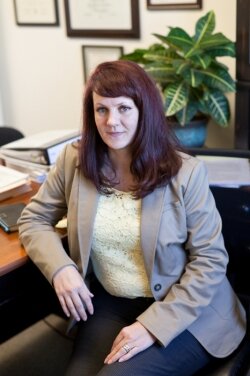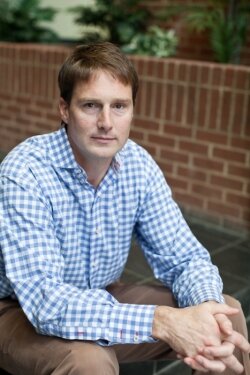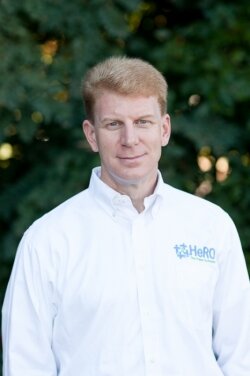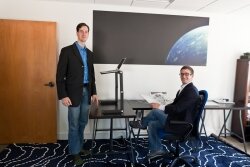Angels among us: How Charlottesville is becoming a hot spot for start-ups
-
 Crystal Icenhour, president and science officer at PHTHISIS.Susan Parmar
Crystal Icenhour, president and science officer at PHTHISIS.Susan Parmar -
 Face of an angel: Hedge funder Jaffray Woodriff has funded several local start-ups.Susan Parmar
Face of an angel: Hedge funder Jaffray Woodriff has funded several local start-ups.Susan Parmar -
 Jeff Alms, vice president of Medical Predictive Science, which developed an algorithm that identifies sepsis in newborns.Susan Parmar
Jeff Alms, vice president of Medical Predictive Science, which developed an algorithm that identifies sepsis in newborns.Susan Parmar -
 Baron Schwartz and Kyle Redinger have their head in the "cloud" after raising $2.6 million to launch VividCortex.Susan Parmar
Baron Schwartz and Kyle Redinger have their head in the "cloud" after raising $2.6 million to launch VividCortex.Susan Parmar
By Peter Galuszka
Her three-month-old infant Benjamin strapped to her chest, Crystal Icenhour moves from room to room in a cream-colored building on a side street of downtown Charlottesville. “And that,” she says pointing to several trays of plastic-filled bags near a laboratory, “is our product.”
The small bags are sent via Federal Express to various medical laboratories, many at hospitals, from her firm named PHTHISIS Diagnostics, which is Greek for “tuberculosis.” After being mixed with water, their contents are used to measure molecular standards and provide quality control for highly sensitive diagnostic devices.
The seven-person firm offers a line of 15 such products since it began operations in 2006. The firm got started with $4.5 million in grants, many of them from the National Institutes of Health, the National Science Foundation and the state. Angel investors in the local area and North Carolina kicked in about $1 million.
After a lengthy incubation, PHTHISIS is finally showing results. So is Charlottesville as a haven for budding high technology centers. For years, the city has been a much-lauded, up-and-coming tech sector where bright minds come up with new ideas and win funding from angel investors or venture capitalists.
Charlottesville is suddenly starting to get national attention.
It has been ranked as No. 8 nationally, just behind Austin, Texas and ahead of Champaign-Urbana, Illinois, in terms of venture capital deals per 100,000 of population, according to a group run by national trend watcher Richard Florida. Charlottesville racked up 5.1 venture capital deals per 100,000 in population, according to the survey.
PHTHISIS is one of about 200 burgeoning companies or start-ups that many believe are finally giving the Charlottesville region traction as a rising player in the high-technology world.
Another firm, Medical Predictive Science, has created algorithms that can detect sepsis, a major killer of neonatal infants. HemoShear helps replicate the biology of human organisms for drug testers. A firm begun last year, VividCortex, offers software that helps users take advantage of cloud computing. And the list goes on.
Charlottesville's rising star in the high-tech arena is hard to explain other than serendipity. Popular tech essayist Paul Graham offers his theory. “I think you only need two kinds of people to create a technology hub: rich people and nerds,” he wrote in an essay seven years ago. “They’re the limiting reagents in the reaction that produces start-ups, because they’re the only ones present when start-ups get started.”
Miami, for instance, has rich people but few nerds. Pittsburgh has the opposite problem. By luck of the draw, Charlottesville has both, despite its small size. “I love it here,” says Icenhour, a native Texan with a doctorate in pathobiology and molecular medicine, who was recruited in 2006 from Duke University Medical School and conducted research at the famed Mayo Clinic in Minnesota. The mother of three is now president and science officer of the firm.
Icenhour’s job choice reflects what the area has to offer. Anchored by the University of Virginia, the region has special strengths in life sciences and information technology. There’s a top-rated law school plus highly regarded graduate and undergraduate business schools. The region’s bucolic beauty draws wealthy new residents who have left Wall Street and are willing to open their checkbooks for new and exciting ventures. And, the area is fairly close to technology-saturated regions like Northern Virginia, where some of the most advanced projects in defense and communications are hatched and nurtured.
One major champion of high-tech entrepreneurialism is UVA President Teresa Sullivan, who, ironically, was temporarily forced from her job last year for allegedly being a technology laggard, among other reasons. Sullivan advises her faculty to help their students make the link between research and business start-ups much sooner in the course of their academic studies. Before, entrepreneurship wasn’t mentioned until upper graduate classes. She’s also been a big advocate of the newly refurbished Innovation Laboratory opened to the local community by Darden.
Several sources have told The Hook that Sullivan is a breath of fresh air after the tenure of John A. Casteen, the former university president who shunned putting much attention on tech start-ups while favoring the school’s historic strengths in liberal arts, especially history and literature.
University graduate schools reflected the Casteen bias. The Darden Graduate School of Business tended to ignore entrepreneurship in favor of churning out bright bean counters and strategists to serve established large corporations and Wall Street. Until recently, Darden and the undergraduate McIntire School of Commerce did not broach classes in entrepreneurship until the upper grades.
The decades-old mission was consistency, excellence, entitlement and no risk.
“There was still a mindset that you got into UVA because you were a senator’s son and you muddle along, get out, make a lot of money and create nothing of value,” says Baron Schwartz, a 2003 UVA graduate who co-founded VividCortex.
Meanwhile, Charlottesville’s natural high-tech strengths started emerging. “There’s always been a big emphasis on life sciences; it has far outstripped everything,” says Philippe Sommer, director of entrepreneurial programs at the Darden School. “I don’t know what happened in the last couple of years, what the cause and effect is. Teresa Sullivan has a real interest and is more friendly to high technology. She says that, unlike her predecessor, we need to be a much more active player in R&D.”
Richard Crawford, managing director of New Dominion Angels, a statewide group that helps fund early-stage companies, points out that there are 40 to 50 biotech firm start-ups and about 200 or so entrepreneurial firms overall in the local area.
Aside from Northern Virginia, Charlottesville is fast becoming the state’s tech start-up hotspot, out-distancing Blacksburg as well as Richmond. “You have the convergence of a major university, the town, a medical center, law school, and very strong graduate and undergraduate business schools – and you have the elements of human capital,” he says. He sees the area becoming “more similar to Stanford or Atlanta, home to Georgia Tech.”
Jaffray Woodriff, a Charlottesville-bred hedge fund and commodities trading superstar who bankrolls local startups, agrees that the mix of a big research university in a small town is one reason the area is perking up. But there's more to it. “There’s a presence of a centralized, authentic, walkable downtown,” he says. Bright people can stumble into each other strolling on the Mall and exchange ideas. There’s also an informal group of investors willing to back good ideas.
* * *
As exciting as the tech start-up world may be, it still carries great risks. An unspoken rule of thumb– nearly half of new ventures will fail, a quarter may make their original investment back and another quarter will actually make real money. Some find even these odds too generous.
There’s plenty of competition for ideas and controversy of ownership, making it handy to have a good law school nearby. Information technology firms may fly out of the starting gate, but it’s a different story with life science entities, which tend to dominate the Charlottesville scene. Their products need various stages of testing, clinical reviews and often, approval by the U.S. Food and Drug Administration that can cost millions and take years. They need investors who are both rich and patient.
Despite its advantages, Charlottesville is behind the curve with high tech and as such, is still stuck in what is called the “angel” stage of investment. In it, optimistic investors pool their funds or give individually to start-ups they consider to be promising. They stroke checks for anywhere from $10,000 to $1 million with the hope of making it back— or maybe not.
If the struggling newbie shows life, it can then move on to the higher-level institutional venture capital stage where risks tend to be more thoroughly scrutinized. If the firm really makes progress, it can go through an Initial Public Offering (IPO), become public and sell stock. The ultimate goal is to launch exciting and useful new products— and maybe get bought by a much bigger firm at a price that makes the swashbuckling risk takers very rich.
“There’s a real distinction between angel and professionally managed money,” says Frank Ball, an official of New Dominion Angels, which pools resources to help start-ups statewide. “Angels will invest from their own checkbooks while professionals invest other people’s money. That can be a problem, because the angels often fall in love with the entrepreneur and bet on the jockey instead of the horse.”
Charlottesville has about a dozen or so angels who may have come from Wall Street with significant assets and live in the area. “There are a lot of high net worth individuals, and they prefer not to be identified," says Michael P. Drzal, a lawyer and technology specialist with the LeClair Ryan law firm.
Angels may work alone or in groups where they meet discreetly to review proposals and make their decisions. “They often write checks for $500,000 or more,” says Drzal. “They still want to stay active.”
Prominent investor Woodriff is actually a homegrown Virginian from a 500-acre farm in Orange County, north of Charlottesville. The reclusive 44-year-old mathematics whiz earned so-so grades at UVA where he graduated in 1991, according to a 2009 article in Institutional Investor.
But he loved computers and mastered quantitative programs that gave him an edge trading global commodities. Aside from a stint at a Société Générale office in New York, he’s spent most of his time in Charlottesville, now heading a firm called Quantitative Investment Management— a firm so secretive it asks for a password to enter its Website.
Forbes magazine has ranked Woodriff at No. 29 of the nation’s top 40 hedge fund traders. Institutional Investor praised him as “The Monk of Managed Futures.”
Despite the good news about Charlottesville’s emergence as a player, it still is something of a sleeper as a tech hub. And some of its attributes haven’t quite kicked in full gear, according to Schwartz, president of VividCortex. The software firm got started with $2.6 million in seed money, including funds from the Northern Virginia-based Center for Innovative Technology and from Woodriff.
“We have an amazing quality of life and low costs, but there still is a question mark about labor,” Schwartz says. “There is a shortage of talented people," he says. Consequently, VividCortex, based in the Lewis and Clark building downtown, employs several people in Uruguay to complement his small Charlottesville staff. He uses Uruguayans because he previously had worked with a firm that had South American operations.
Charlottesville's relative tardiness as an emerging technology center means it will take some time before people stop leaving and outsiders consider moving here without hesitation. Schwartz, who is from Charlottesville, says competition for able programmers is intense. “You get calls all the time, sometimes from Google, and they want to fly you out,” he says. Many local players were once in Seattle, the Bay area, San Diego or around Boston.
The problem locally is that attractive prospects from outside the area think twice about leaving those areas to come to Charlottesville. “What happens if a year or two from now there is no VividCortex? Can they find another job here?" Schwartz poses. But when a firm becomes established, that problem tends to diminish.
Such is the case with Medical Predictive Science that got a relatively early start in 2003. Jeff Alms, executive vice president, says that his firm’s success is based on a medical device with special algorithms that can monitor patient performance in very sensitive conditions. It can, for instance, be used to predict whether a neonatal baby is undergoing particular stress that might lead to sepsis, a top killer of infants in their first three days of life.
The firm’s story shows just how long life sciences start-ups need to get going. The company's technology was licensed in 1999. The firm was set up with angel money in 2003, the year the FDA cleared it for sale. “But we didn’t push it until the last three or four years after we had a very large clinical trial,” says Alms, who joined the firm in 2007 and says sales are going well.
Aside from having a viable, sellable product, hiring virtual labor can ease the problems of the Charlottesville worker shortage. One example is NeuroVentures Capital, a venture capital firm that helps fund firms involved with treating disorders of the central nervous system, says company official Dan O’Connell.
Founded in 2000, the firm has executives who can work in different locations but still communicate. “I reside in Charlottesville,” says O’Connell, “but most of my actual work is on the West Coast and in Boston. Our chief executive officer is in New Jersey and our chief operating officer is in California.” They communicate via Skype video on the Net and exchange emails constantly. “There has been a lot of progress in the maturation of life sciences,” says O’Donnell, “But it (the area) doesn’t feel like a hotbed for investment in a traditional sense.”
* * *
To get a sense of how the area is trying to grow a fresh crop of tech-savvy entrepreneurs, peek inside a glass-walled room in a newly opened red brick building near the Darden School, where about two dozen graduate business students listen attentively as two of their peers make presentations.
It's a lunchtime program at Darden’s Innovation Lab. The 90-minute session includes a talk from Elizabeth Pyle, a venture capital veteran, followed by a frank Q&A about getting ideas and financing and then, hopefully, bringing a nascent product to market.
Opened in April with President Sullivan on hand, the i.Lab features a number of meeting rooms and a coffee shop where a barista prepares lattes to music from a 1960s-style vinyl record player. The open-air shop features comfortable seating where people can share ideas and brainstorm.
Although some sessions are closed, the i.Lab is open to the public, says Kathryne Carr, director of the incubator and founder in 2000 of Tall Oaks Capital, one of the area's pioneering venture capital firms. The idea is to bring in community entrepreneurs from Charlottesville, Waynesboro and Albemarle County so they can pick up information from Darden students and faculty plus be available to share ways they have solved problems.
At one end of the building is a semi-circular “Idea Well” that stretches 10 feet tall. Pinned to the wall are a series of handwritten notes from students asking for “beta testers” or “programming resources.” The system puts people who haven’t met in touch.
One goal of the i.Lab is to work directly with local start-ups and help nurture them. It's a competitive process, with 48 firms applying and only half selected. “They work for 10 weeks putting together a business plan, and we spend the summer working through each of those objectives.” Carr says. They also ponder “proof of concepts” over the school year to ensure the business plans are viable.
The current emphasis is to create an “innovation ecosystem” across the university’s 11 schools,” says Thomas C. Skalak, a biomedical engineering professor who is UVA's vice president for research. The university started laying the foundation for the new tech world by launching a summit to bring venture capital money to the school and a UVA Entrepreneurship Cup where students display projects for competition. Recruited were start-up experts from technology-saturated area such as La Jolla, California.
A big step was involving the school in the Wallace H. Coulter Foundation, a Florida-based group named after a brilliant inventor of medical devices that doles out $1 million a year to nine select universities, including UVA, which has a $20 million endowment for research. Unlike typical research projects, those funded through the Coulter program have to prove their economic viability with an eye toward creating high-end tech jobs that can’t be easily transferred overseas.
Should the approach succeed, Charlottesville could address one of its weaknesses— creating a highly skilled and sustainable labor force. If that happens, the thinking goes; even more funding would become available. Charlottesville would move beyond its angel funding baby steps to something more formidable. A chronic problem is that start-ups often can't make it past the angel stage to future levels where reviews by investors are far more rigorous.
The progress so far is encouraging. According to Richard Crawford, managing director of the New Dominion Angels, it could be sustainable.
“Charlottesville’s momentum has grown over the last five years,” he says. “It is just now getting take off. There is a critical mass employment issue— you need people with skills. If you get that, then more people might move here.”
He puts Charlottesville in the spot where tech and start-up dynamos Stanford and Palo Alto were in the 1975-1980 era. “Those places have been in venture capital since the 1970s and now their grandchildren are doing it. You’re not there yet in Charlottesville.”
Northern Virginia took hold in the mid 1990s with the rise of the Internet, America Online, telecommunications firms and the post 9/11 defense industry boom. “There’s more IT in Northern Virginia than in Silicon Valley, but it doesn’t get the same press because it is government,” he says. Charlottesville is not as advanced as the Research Triangle area near Raleigh-Durham but is ahead of Richmond.
“Richmond is beginning to be a player,” says Crawford. “It has the size and more and more tech is coming out of VCU. There is a biotech park. The problem with Richmond is that it is not oriented historically towards investing in tech.” Blacksburg is more focused on engineering and is a bit too remote, some believe.
If the long-in-coming convergence of community and university assets keeps going, geography could help seal the future because Charlottesville is only a couple of hours from Northern Virginia and has relatively easy air and highway connections. A possible winning combination, Crawford says, would be the creation of a triangle linking Charlottesville, Northern Virginia and Richmond. Harrisonburg, which is quietly snagging some new tech start-ups, would be part of it. “There’s a lot of money here and it could come together,” he says.
By comparison is Boulder, Colorado. The Rocky Mountain city has a similarly-sized population and is dominated by a highly-regarded university. But trend watcher Richard Florida’s study showed that Boulder far outclasses Charlottesville in start-ups. The local area had only 5.1 venture capital deals per 100,000 while Boulder was far ahead with 13.6 deals per 100,000.
Things seem to be coming together for PHTHISIS, but they will be eventually confronting taking the firm to a higher level, says Icenhour. Besides selling its molecular diagnostic products, the firm is waiting for FDA approval on some new ones. Problems remain. Some of the laboratory gear marked by “Biohazard!” warning signs is very expensive. Staffers and researchers need to be paid competitive rates. “In the next five to 10 years our goal is to be acquired by a larger company,” she says. “We don’t have the bandwidth or the deep pockets.”
The same is true for Charlottesville. So far, so good, but reaching the next level will be a challenge.
Peter Galuszka is a Richmond-based freelance writer who is a former BusinessWeek editor and bureau chief.
11 comments
"becoming a hot spot for start-ups" I see why you're closing, you don't know how to do research... Value America, Museum Company, Boxer Learning, You're idiots. Ciao!
voltron, how dare you! Cheerleading the entrepreneurial fetish that our society has is patriotic!!!
Greed is good and if you make money, it means you're a good person.
Clearly, you hate our freedom.
Practically everything you enjoy including the time, energy, freedom, and computer required to write the above comment is a result of the entrepreneurial fetish that is otherwise known as the American Dream. I have a sneaking suspicion you hate our freedom.
Elite,
It is also a result of the public monies spent on research, development, and education. ARPNET, the Apollo project, etc.
Without that public spending, you'd be scribbling your incoherent, nonsensical gibberish on carbon paper with a charcoal pencil.
Public spending? Do you mean to say the government's Robin Hood for taking money from taxpayers with the force of the barrell? I'd much rather be living in the stone age to tell you the truth. No taxes.
Charlottesville can only get to the next level if it solves the talent issue. Until startups are born, founders exit, AND acquirers stay put (this is a must), will the talent base in our City grow.
Ah, now I remember why I'm glad I no longer live in Charlottesville. What a bunch of uppity blowhards this comments section is. As it always is for any online website in Charlottesville.
I made the escape happen. Seriously.
Talent increase is underway in Cville. Biggest need is infrastructure. Ultra high-speed network availability to business and residential communities in Charlottesville (and Crozet) will be required to gain a competitive advantage. Check out Gig. U project of which UVA is a member. http://www.gig-u.org/
What I need is more follow up and follow through from my partner and less risk management. If something doesn't happen soon I'm gonna give up, I just don't have the capital.
Looking to develop a prototype for patent application. It's hush hush for now, someone might steal my idea and make $MILLIONS$.